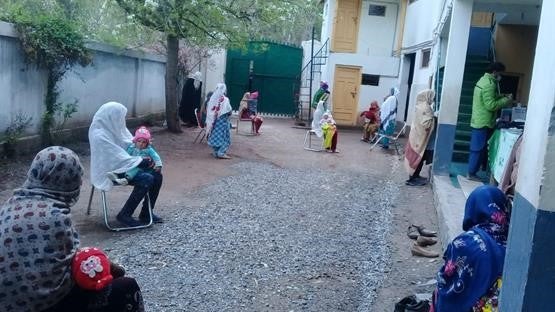 Visitors practicing social distancing at an Expanded Program of Immunization (EPI) center in Pakistan. © EPI (Pakistan)
Visitors practicing social distancing at an Expanded Program of Immunization (EPI) center in Pakistan. © EPI (Pakistan)
In responding to the crisis, the World Bank's Pakistan team turned to the National Immunization Support Project (NISP) and its pooled procurement mechanism to deliver speedy assistance.
NISP has achieved transformational improvements in immunization by boosting national vaccination coverage to 66 percent -- up from 54 percent -- and introducing game-changing structures and mechanisms to strengthen existing systems.
The World Bank's contribution to immunization in Pakistan began in 2012 when one of our reports drew attention to the gaps in the government's Expanded Program on Immunization (EPI), which was established to protect children against vaccine preventable diseases. Its recommendations culminated in NISP, a project strengthening the EPI program. Federal and provincial governments, the World Bank, GAVI, USAID, the Gates Foundation, UN technical agencies and NGOs are all helping NISP meet its goals under one shared framework.
One of NISP's key features is a pooled procurement mechanism that has successfully procured an uninterrupted supply of vaccines for the past four years. Because provincial governments now have almost complete responsibility for health, this process allows for efficient, collective planning of essential procurements.
When the COVID-19 outbreak began earlier this year, NISP’s pool procurement mechanism provided a fast, structured way to procure essential supplies such as masks and other personal protective equipment for frontline health care staff. It was leveraged under the World Bank's Pandemic Response Effectiveness in Pakistan (PREP) project to obtain $1.5 million in masks and protective gear from $8.5 million in rapidly reallocated NISP funds. This very first procurement of protective equipment in the Bank's South Asia region was deployed through NISP and legal arrangements with the UN partners.
Providing a platform for speedy procurements is not NISP's only contribution to fight the coronavirus emergency. Our regular joint missions with the Gates Foundation, Gavi and USAID to all parts of the country laid the groundwork for the capacity and relationships that are needed to address COVID-19. NISP's financial management capacity and procedures has allowed for the smooth flow and oversight of funds. The implementation capacity of federal and provincial health agencies is now being leveraged for ongoing efforts under PREP.
NISP also continues to ensure sustainable delivery of immunization services. NISP has transformed immunization financing through detailed accountability of public funds and by incentivizing regular financing of this core public health function, laying the groundwork for fiscally sustainable financing of primary health care. This is fundamental to helping Pakistan achieve its goals for universal health coverage.
While serious consequences of COVID-19 are upon us, the last thing Pakistan can afford is the resurgence of vaccine-preventable diseases as collateral damage of this pandemic. The EPI program continues to deliver vaccination services while maintaining social distancing precautions.
Sometimes we forget that development is a partnership, and implementation capacity has a human face. By working together with our clients toward a common goal, we build personal relationships and trust. This is valuable capital in an emergency, when effective action requires rapid decisions.
NISP successes were not achieved in a day. They are a result of continuous and tireless efforts by the Bank, our partners, and the government of Pakistan that have built a results-focused partnership aimed at achieving a fundamental health goal. This has established capacities, relationships, and trust -- all of which could be quickly tapped for the coronavirus emergency.
In the COVID-19 public health crisis, NISP has provided a platform for immediate action.





Join the Conversation